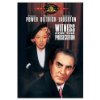 This 1957 courtroom drama is based on a short story, and later a play, by Agatha Christie. It involves the seasoned barrister and curmudgeon Sir Wilfred Robarts, masterfully played by Charles Laughton. He takes on the murder defense of Leonard Vole (Tyrone Power). Robarts’ private nurse (Elsa Lancaster) objects, constantly reminding the barrister of his doctor’s advice to stay away from criminal cases due to ill health. Vole is accused of the murder of a wealthy older woman Mrs. French (Norma Varden) who appeared to have fallen in love with him and changed her will to give Vole the bulk of her large estate. Circumstantial evidence strongly points to Vole’s involvement.
This 1957 courtroom drama is based on a short story, and later a play, by Agatha Christie. It involves the seasoned barrister and curmudgeon Sir Wilfred Robarts, masterfully played by Charles Laughton. He takes on the murder defense of Leonard Vole (Tyrone Power). Robarts’ private nurse (Elsa Lancaster) objects, constantly reminding the barrister of his doctor’s advice to stay away from criminal cases due to ill health. Vole is accused of the murder of a wealthy older woman Mrs. French (Norma Varden) who appeared to have fallen in love with him and changed her will to give Vole the bulk of her large estate. Circumstantial evidence strongly points to Vole’s involvement.
Vole claims his defense is based on the fact that his wife, Christine (Marlene Dietrich), will testify that he arrived home the evening of the murder long before it occurred. Robarts, of course, counsels Vole that the testimony of a wife in such a situation will be suspect. Robarts’ first meeting with Christine leaves him concerned with her demeanor and sincerity.
The trial of the case in the Old Bailey, with all of its pomp and circumstance, is the highlight of the film. The prosecution first presents its circumstantial case and the interchanges between Robarts and the prosecuting counsel are noteworthy. In one instance he objections to a line of the prosecution’s evidence by stating that if his learned colleague is going to both ask and answer the same question, the presence of the witness “is superfluous.”
To the shock of Robarts and the viewing audience, the prosecution’s last witness is Christine Vole. Robarts immediately objects, but Christine then testifies that her marriage to Vole was a sham, since she was already married when she met Vole and her first husband is still alive. Her testimony against Vole is damning, including her claim that he arrived home on the night of the murder with blood on his clothing and told her that he had killed Mrs. French. Robarts’ cross examination centers on having Christine admit that she told a number of lies before appearing in court that day and concludes with his statement that he is surprised “the testament did not leap from your hands” when she took the oath.
The movie’s conclusion is riveting. Robarts is contacted by a woman (Christine in disguise) who, in exchange for a small sum of money, provides him with letters written by Christine to her “lover” Max. They point to a compelling motive for her to lie under oath. He has her called to the stand again and confronts her with the letters. Her only response is: “Damn you! Damn you! Damn you!” Vole is acquitted and following the ensuing pandemonium Robarts is left in the courtroom with Christine. She tells him that her letters were a fraud. There was no Max. Her husband told her he committed the murder and she believed that her being discredited as a witness for the prosecution was the only thing that could save Vole from conviction. Vole reappears and willingly, due to double jeopardy protection, confirms what his wife said. An attractive young woman then appears and she and Vole embrace. He admits that the two of them are going away together. Christine then grabs a knife from the counsel table and kills him. As Christine is led away by the authorities, Robarts makes it clear that his next effort will be her defense because she did not murder Vole, she “executed him.”

For an alternate view of Her Majesty’s justice — as far as one can imagine from the trappings of Old Bailey — I nominate “Breaker Morant”.
I liked “Breaker Morant” a lot. It’s not my nominee for “favorite law movie,” but I enjoyed it.